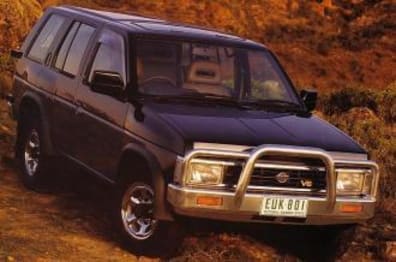
Used Nissan Pathfinder review: 1995-1998
- Nissan Pathfinder
- Nissan Pathfinder 1995
- Nissan Pathfinder 1996
- Nissan Pathfinder 1997
- Nissan Pathfinder 1998
- Nissan Pathfinder Reviews
- Nissan Reviews
- Nissan SUV Range
- SUV
- Nissan
- Used Car Reviews

MODEL WATCH
A measure of the change in the four-wheel-drive concept is the radical alterations the Pathfinder underwent in the move from the WD21 to the R50 in 1995.
The old WD21 was based on the Navara one-tonne pickup and used the ute's separate chassis frame as its foundation, but the R50 was all new and boasted full monocoque construction like that of a regular family four-door. Monocoque construction results in a lighter body, but one that's more rigid. As a result, it provides a more stable and better platform on which to build decent handling, steering and braking performance.
Nissan offered one powertrain in the Pathfinder, one that gives clear clues on the company's intention for the car.
The engine was a 3.3-litre single overhead camshaft fuel-injected V6 unit. It was derived from the sweet free-revving V6 that powered the 300 ZX sports coupe in the 1980s, so it was a well-proven unit. Power in the Pathfinder was a maximum of 125kW at 4800 revs and torque peaked at 266Nm at 2800 revs. The only transmission was a four-speed automatic and off-road die-hards were horrified that Nissan didn't offer a manual gearbox.
The four-wheel-drive system offered the choice of four-wheel-drive high and low and a new automatic option which chose the best drive option for the conditions.
The Pathfinder rode and handled well and was quite competent off-road, with good gearing and ground clearance.
There were two models in the R50 Pathfinder range. It began with the RX, which came standard with airconditioning, central locking, power mirrors, cloth trim, carpets and four-speaker cassette sound. In a 1997 update it also got power windows.
The other model was the Ti, which was more comprehensively equipped. In addition to the equipment fitted to the RX, the Ti also boasted colour-coded bumpers, chrome grille, chrome wheels, roof rack, wheel arch flares, auto airconditioning, dual front airbags, remote central locking, ABS, CD sound, velour trim and power windows.
IN THE SHOP
Nissan specialist Jerry Newman says that little goes wrong with the R50 Pathfinder.
While it has been developed over the years, the V6 engine dates back to the 300Z sports car, so it's a well-proven and reliable unit. It has a belt driving the camshafts and that needs to be replaced every 100,000km, and the spark plugs are difficult to get to, which makes replacing them time-consuming.
The auto gearbox gives very little trouble. The same goes for the drive line, although Newman says he's had a couple of noisy rear diffs which he has been able to fix by using a higher quality oil. Servicing in general is more expensive. Wear and tear tends to be higher than that of a regular passenger car simply because the Pathfinder, like all 4WDs, is bigger and heavier. For the same reason, fuel consumption tends to be higher than a regular family car; Newman says 14-15l/100km around town is normal.
CRUNCH TIME
The Pathfinder rated average for occupant protection in the annual survey of crashes.
While the Ti model had dual front airbags and ABS, the RX missed out on these fundamental safety systems.
The Pathfinder's handling and braking performance was better than most four-wheel-drives of the time, providing the driver with a better chance of avoiding crashes.
Pricing
| Year | Price From | Price To |
|---|---|---|
| 1998 | $3,410 | $5,720 |
| 1997 | $3,410 | $5,720 |
| 1996 | $3,410 | $5,720 |
| 1995 | $3,080 | $6,050 |
Pricing guides
Range and Specs
| Vehicle | Specs | Price* | |
|---|---|---|---|
| ST (4X4) | 3.0L, ULP, 4 SP AUTO 4X4 | $4,070 – 6,050 | 1995 Nissan Pathfinder 1995 ST (4X4) Pricing and Specs |
| RX (4X4) | 3.3L, ULP, 4 SP AUTO 4X4 | $3,850 – 5,720 | 1995 Nissan Pathfinder 1995 RX (4X4) Pricing and Specs |
| Ti (4x4) | 3.0L, ULP, 4 SP AUTO 4X4 | $3,080 – 4,840 | 1995 Nissan Pathfinder 1995 Ti (4x4) Pricing and Specs |
$3,850
Lowest price, based on third party pricing data







